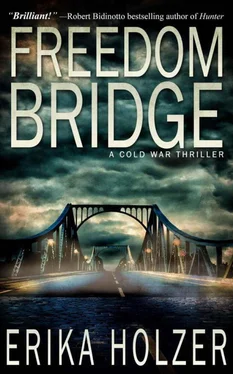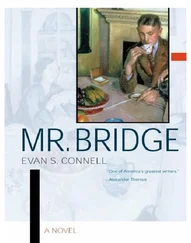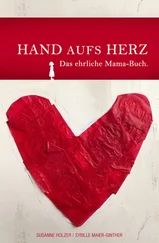He wrinkled his nose.
I wish they’d repair the smell around here.
It was going on three months since Berlin had fallen, but the stench of open sewers and the occasional dead body still permeated the air. It was an ongoing complaint with the GIs. The goddamn Krauts had emptied their cesspools into the Havel River.
“Medic! Where the hell are you?”
Still here, unfortunately , he brooded.
Brenner stepped over planks and stray pieces of iron, keeping carefully to the side of Glienicker that was propped above the water line by wooden pedestals parallel to the pontoons.
At the bridge, while he attended to a soldier’s cuts and bruises, he fell into a conversation with a Russian officer he knew, but whose job was a mystery to him. He and Major Dmitri Malik had played chess a few times. While Brenner could beat the man with his eyes shut, he usually let Malik win against the day Brenner might want a favor. Then, too, there was the profitable black market business that the two of them were engaged in.
Launching into his usual complaint, Brenner mentioned that he was going to miss the start of medical school and lose an entire year. That guys who’d arrived in Europe—mostly infantrymen—were rotating home before he was.
They had been speaking English. So when the major suddenly looked around, lowered his voice, and switched to German, Brenner was startled.
“Tell me, Doc, what do you need to get orders moving you out sooner?”
“That’s what frustrates the hell out of me, Major. It takes next to nothing. Just a clerk at division—probably a corporal—who inserts an earlier date on my transportation orders and sticks them in some box. Why do you ask?”
“I have friends everywhere,” Malik said, dodging the question.
Of course you do, Major.
They ran into each other on the bridge a few days later. After the usual pleasantries, Malik said, “How would you like to leave Berlin in a week or so, Kurt?”
Brenner thought he hadn’t heard right. After a moment he said, “You can pull it off that quickly?”
An eloquent shrug. “That depends on you,” Malik replied.
“Anything, Major! Penicillin. More medical supplies. Petrol. Dope.”
Malik looked bemused.
“If it’s money,” Brenner said, his mind racing, “I’ll send you some as soon as I get back to New York—within reason, of course. A few thousand? Maybe five?”
“I have something else in mind,” Malik said, his smile enigmatic. “You’ve always wondered what my position was but never had the nerve to ask. I’m NKVD—Soviet Intelligence. My work is with Operation Keelhaul.”
It was dark as Brenner left Soviet headquarters in East Berlin and picked his way gingerly through brick-littered streets, stopping only to show his pass to a pair of Russian soldiers at Checkpoint Charlie before crossing from the Soviet zone back into the American.
It was all arranged. Tomorrow morning the Ukrainian kids would be picked up by Soviet authorities, including the Communist version of the Red Cross. Malik had assured Brenner that under Operation Keelhaul, the children would be well taken care of.
His young subordinate, Lieutenant Aleksei Andreyev, had reinforced Malik’s assurances. “We have a great deal more to offer these children than placing them in foster care—or worse, stuck in some displaced-person camp,” Andreyev told Brenner.
“Come now, Kurt,” Malik interjected, picking up on Brenner’s skepticism. “If at the Yalta Conference, the President of the United States—Franklin Delano Roosevelt, no less—and now his successor, Mr. Truman, promised to ‘encourage’ repatriation for some larger political end, who are you to question the judgment of two American presidents?”
An unanswerable argument, Brenner told himself. Besides, why would anyone want to harm a bunch of kids?
It hadn’t been easy finding them—not at first. Eventually, Brenner had tracked down First Sergeant Al Rosen, who remembered him from when the Red Cross guy had rescued the children. A couple of drinks loosened Rosen’s tongue. The children had been moved from place to place until they’d ended up with the nuns, he told Brenner. Arrangements were being made to have them moved to a DP camp in France.
After leaving Malik and his aide, Brenner walked aimlessly for hours, concentrating on the formidable obstacle course typical of post-war Berlin: broken pieces of pavement, mounds of rubble, collapsed buildings, gaping holes camouflaged by a thin layer of gray-black dust—
And came to an abrupt halt at the sound of angry voices. He realized he’d ended up practically at the main gate of the nunnery.
The criminal automatically returning to the scene of the crime?
It was where the Ukrainian children would spend their last night before being repatriated in the morning. So why was a Soviet truck parked in front right now? Brenner wondered.
So much for “tomorrow’s” arrangements.
The Russians always kept one step ahead of you, he thought. It was worth remembering.
Ducking into the shadows, Brenner watched a group of Russian soldiers emerge through the nunnery gates led by—no surprise—Major Dmitri Malik. Ten whimpering children were hustled into the back of a truck. Brenner watched the truck pull away headed, no doubt, for Potsdam in East Germany.
An American jeep roared out of the shadows. Brenner almost jumped out of his skin. Joe Cherner flung open the door on the opposite side of the jeep. “Good timing, Kurt,” he said tightly. “I’ve been watching the nunnery off and on for weeks. Figured something like this might happen. Hop in. Let’s see where the Russkies are off to. What are you doing here so late?”
“Same as you, Joe,” Brenner said quickly. “I’ve been keeping an eye out from time to time. The Ivans are good at staying one step ahead of you,” he added as an afterthought. It was true enough.
Keeping well behind the Soviet truck, Cherner followed until he was pretty sure where they were headed. “Glienicker Bridge,” he muttered.
By the time they got there, a Russian truck had pulled up at the West Berlin end of Glienicker Bridge. Two American sergeants sat in a jeep facing West Berlin. Cherner skidded to a gut-wrenching stop right behind Ivan’s truck.
“This bridge is officially closed to vehicular traffic until repairs are completed,” one of the GIs announced.
“No problem, sergeant,” Malik said politely. “We will walk.” He signaled to his men, who proceeded to hustle the children out of the truck.
The column moved to the center of the bridge, Major Dmitri Malik in the lead, followed by other Russian soldiers who were hustling the children along. A grim-faced Lieutenant Aleksei Andreyev brought up the rear.
“Don’t let them through!” Cherner yelled to the sergeant behind the wheel of the jeep.
“I can’t stop them if they’re walking, sir!”
“Then I will!” Cherner’s voice was choking with rage.
Brenner shivered—and not from the cold night air. The bridge’s emergency lighting was a blessing. In the dim light, he couldn’t see the expressions on those small faces. But there was no way he could miss Irina. The girl was clutching the tiny three-year-old in her arms.
The sound of footsteps mingled with the slapping of waves against Glienicker’s damaged side. As Irina moved to the unobstructed section of the bridge, the children following behind her, she teetered slightly at the edge.
“Keep to the other side!” Malik warned—in English first, then Russian.
Brenner’s breath caught in his throat. It suddenly occurred to him that the children couldn’t understand either language!
Читать дальше












